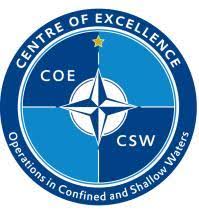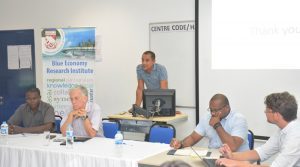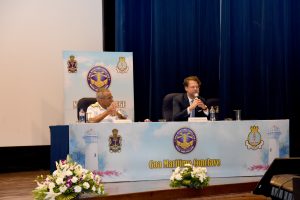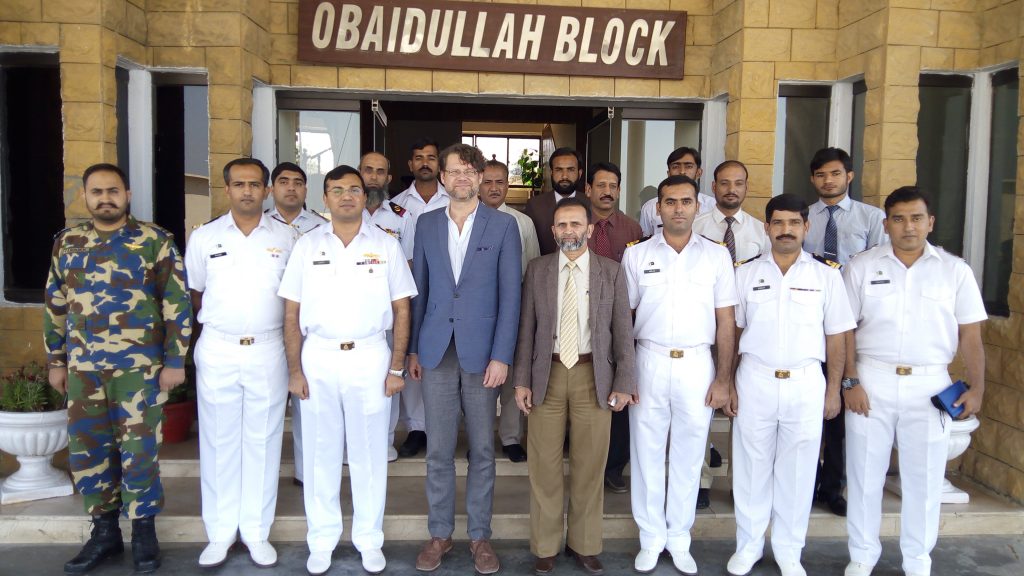 The 6th annual legal conference of the NATO Centre of Excellence on Operations in Confined and Shallow Waters (COE CSW) legal conference took place in Copenhagen, Denmark from the 25 to 27th of September. More than 130 naval officers, attorneys, and professors from 30 countries across the globe discussed contemporary maritime issues including cyber threats, self-defense, ocean conservation and marine pollution, and regional security challenges. I had the pleasure to participate in the events.
The 6th annual legal conference of the NATO Centre of Excellence on Operations in Confined and Shallow Waters (COE CSW) legal conference took place in Copenhagen, Denmark from the 25 to 27th of September. More than 130 naval officers, attorneys, and professors from 30 countries across the globe discussed contemporary maritime issues including cyber threats, self-defense, ocean conservation and marine pollution, and regional security challenges. I had the pleasure to participate in the events.
Category Archives: In the field
Briefing of Maritime Security Strategy Working Group of the Government of Seychelles
At the 2017 Our Oceans Conference, Seychelles president Danny Faure announced that the country would soon begin drafting a maritime security strategy:
“Maritime security is an extremely important component of the sustainable development of the ocean economy. One of the expected results of the blue economy strategy is greater protection for Seychelles’ ocean space and resources through better coordination across different sectors, application of protective measures and greater use of surveillance and enforcement tools. This is certainly a formidable challenge for a SIDS like Seychelles. But, because of our limited and competing resources, it is particularly important that we have a well thought-out maritime security strategy”.
On December 15th the governmental working group that will draft the Seychelles Comprehensive Maritime Security Strategy held its inaugural meeting. At the meeting, I gave a short briefing on the lessons from other maritime security strategies for Seychelles. I also introduced some of the results of the project SafeSeas so the research outcomes can inform the planning process.
Event on illegal fishing in Seychelles
 On the 6th of December, I contributed to a symposium on illegal fishery in Seychelles waters and the wider Western Indian Ocean region. Titled “Stopping Illegal Fishing: Protecting the ‘Blue Gold’ of Seychelles” the objective of the event was to raise awareness for the problem and to offer a platform for the policy dialogue on how to improve a national and regional multi-agency response. Given Seychelles’ status as a regional and global leader in ocean governance, it is important that the country continues to be pro-active in this important security and development matter.
On the 6th of December, I contributed to a symposium on illegal fishery in Seychelles waters and the wider Western Indian Ocean region. Titled “Stopping Illegal Fishing: Protecting the ‘Blue Gold’ of Seychelles” the objective of the event was to raise awareness for the problem and to offer a platform for the policy dialogue on how to improve a national and regional multi-agency response. Given Seychelles’ status as a regional and global leader in ocean governance, it is important that the country continues to be pro-active in this important security and development matter.
The event was co-organised by the Blue Economy Research Institute, the James Mancham Center for Peace and Security, both from the University of Seychelles and my project SafeSeas. Speakers at the event represent the Seychelles Blue Economy department, the Seychelles Fishing Authority, Seychelles Fishing Boat Owner Association, the Indian Ocean Tuna Commission as well Fish-I Africa. I offered some introductory remarks and chaired one of the two panels.
In my introductory remarks, I stressed that contemporary ocean governance is best appreciated through four conceptual lenses: 1) maritime security, 2) blue economy, 3( ocean health, and 4) blue justice. Each of these agendas are often seen as seperate. Yet, the problem of illegal fishery documents well how all of these hang together. Fisheries, is a major resource in the blue economy, in order to generate revenue from it, it needs to be sustainably managed, and fish require healthy oceans. Sustainable fisheries, raises major distributive justice questions, namely who is to fish how much where and when? Do the revenues go to international cooperations, to the state, or to the small-scale, artisanal professional fishermen or the amateur fishermen. Finally, fisheries is also a security problem. We have learned that organised criminals combine their illicit activities, such as smuggling with illegal fisheries, and we have learned from Somalia that illegal fisheries can create grievances and provide the justifications for engaging in crime.
Presentation at Indian Navy symposium
 On November the 1st I am giving a presentation at a symposium of the Indian Navy. Hosted by the Indian Navy Naval War College in Goa the two-day event is focussed on “Addressing Regional Maritime Challenges” and brings together over one hundred representatives from Indian and Indian Ocean navies. Held for the first time, the Goa Maritime Enclave intends to strengthen collaboration and joint learning across the Indian Ocean. As such it is a further addition to other formats such as the Indian Ocean Naval Symposium or the Sri Lanka Navy’s Galle Dialogue strengthening the maritime ties in the region.
On November the 1st I am giving a presentation at a symposium of the Indian Navy. Hosted by the Indian Navy Naval War College in Goa the two-day event is focussed on “Addressing Regional Maritime Challenges” and brings together over one hundred representatives from Indian and Indian Ocean navies. Held for the first time, the Goa Maritime Enclave intends to strengthen collaboration and joint learning across the Indian Ocean. As such it is a further addition to other formats such as the Indian Ocean Naval Symposium or the Sri Lanka Navy’s Galle Dialogue strengthening the maritime ties in the region.
My talk draws on my recent research on maritime domain awareness and capacity building. I firstly contextualize maritime domain awareness historically, arguing that we have witnessed a series of revolutions in “knowing the sea”, starting out from the British Empires approach to turn the oceans into governable and knowable zones, the rise of attempts to track and monitor maritime traffic for search and rescue as well as environmental management purposes, up to the current day big data revolution in which advanced surveillance technology and anomaly detection is geared at supporting maritime security operations. Zooming in on the Western Indian Ocean I then investigate the claim that maritime domain awareness by virtue strengthens cooperation. I argue that on the one side, the competition between architectures points to a strong geo-political motive in building maritime domain awareness, on the other side we can observe the rise of communities of practice with the objective of working together. I conclude by arguing that advancing shared maritime domain awareness will imply to provide some order to the current complexity of architectures, to re-politicize these projects, to work towards more trust and confidence to enable sharing of information (between agencies and countries), as well as to avoid living in technological fantasies and rely on pragmatic low tech work instead. The slides of the talk are available as pdf here.
Attending FishCrime Symposium in Vienna
From the 25th to 26th of September I am attending the 3rd International Symposium on fisheries crime, als known as FishCrime. The symposium is an annual event for the community of practitioners addressing fishery crimes and Illegal, Unregulated and Underreported (IUU) fishing. The third installment of the event is held at the headquarters of the UN Office on Drugs and Crime in Vienna. I am attending the symposium as an observer, to meet professionals in the field, and to learn more about the problematization of fish and its career on the international policy agenda. Further information on the event is available here.
Visit of SafeSeas core team to Eastern Africa
From the 19th of July the core team of my research project SAFESEAS – A study of Maritime Security Capacity Building in the Western Indian Ocean, funded by the British Academy’s Sustainable Development Programme is scheduled to visit Seychelles and Kenya for a range of stakeholder consultation meetings and for data gathering. For updates and news see our project website.
CGPCS meeting in Mauritius
The 20th plenary meeting of the Contact Group on Piracy off the Coast of Somalia (CGPCS) is expected to become a milestone in the re-organisation of the response to piracy. The meeting takes place in Mauritius in the first week of July. I will attend the meeting in my capacity as an advisor to the chairmen, the government of Seychelles, and as in the last years will report on lessonsfrompiracy.net on the event. Check it out if you want to follow the event.
Visiting Project Partners in the Western Indian Ocean
In March I am visiting the project partners of SAFE SEAS in Eastern and Southern Africa. The goal is not only to deepen collaborations but to develop ideas in which directions to further advance the project. During my stay in the Seychelles, I have also held a strategy meeting with the current secretariat of the Contact Group on Piracy off the Coast of Somalia in order to prepare the next plenary meeting. In addition, I gave a talk in the forum title “Think big, but small is beautiful. Small Island Diplomacy”, organized by the Sir James Mancham International Center for Peace Studies and Diplomacy of the University of the Seychelles. In the talk titled “Creole Foreign Policy: The Seychelles and small state diplomacy” I investigated core insights from the small state literature, discussed the particular strengths of Seychelles and laid out three ideas of how the country can continue its success story. Other speakers were ambassador Barry Faure, and representatives from the Blue Economy Department and the Ministry of Foreign Affairs. The centre will publish a report on the forum in due course.
People first: Pakistan’s approach to Maritime Domain Awareness
Much of recent debate concerns how maritime domain awareness (MDA) and information sharing can be effectively organized, in particular under resource constraints. Surveillance technology and tools for data fusion and algorithmic analysis are expensive. The tools developed by MDA centers in the US, UK or in Singapore are hardly options for lower income countries and regions. Yet, what are the alternatives? An answer comes from Pakistan.
 In 2013 Pakistan has inaugurated its Joint Maritime Information Coordination Center (JMICC). Situated in Karachi and operated by the Pakistani Navy the center has developed an innovative approach to MDA which provides useful lessons for other countries and regional centers. Three core principles underly the work JMICC: inclusivity, community engagement, and responsiveness. During a visit to the center on the 15th of February, I had the opportunity to learn more about how the center works and puts these principles into practice. Each of the principles is discussed in the following. Continue reading
In 2013 Pakistan has inaugurated its Joint Maritime Information Coordination Center (JMICC). Situated in Karachi and operated by the Pakistani Navy the center has developed an innovative approach to MDA which provides useful lessons for other countries and regional centers. Three core principles underly the work JMICC: inclusivity, community engagement, and responsiveness. During a visit to the center on the 15th of February, I had the opportunity to learn more about how the center works and puts these principles into practice. Each of the principles is discussed in the following. Continue reading
International Maritime Conference in Karachi
Pakistan’s most important conference on maritime security is organized by the National Centre for Maritime Policy Research (NCMPR), the think tank of the country’s navy based at Bahria University. This year’s installment of the event is under the theme “Strategic Outlook in the Indian Ocean Region 2030 and Beyond: Evolving Challenges and Strategies”. The conference is held in conjunction with the naval exercise Aman, in which over 70 countries participate.
At the four-day conference (10-14.2), I gave a presentation titled “Pakistan and the Western Indian Ocean Community”. Drawing on the results of our recent analysis of the region, in the paper, I review the current strategic environment in the Western Indian Ocean, argue that the region can find a shared strategic vision in the concept of security community, and outline consequences for Pakistani’s foreign and security policy. I particularly highlight the need for sustained multilateral engagement in fora such as the Indian Ocean Naval Symposium, the Indian Ocean Maritime Crime Forum, the Contact Group on Piracy off the Coast of Somalia, or the Djibouti Code of Conduct process. The paper is available here.